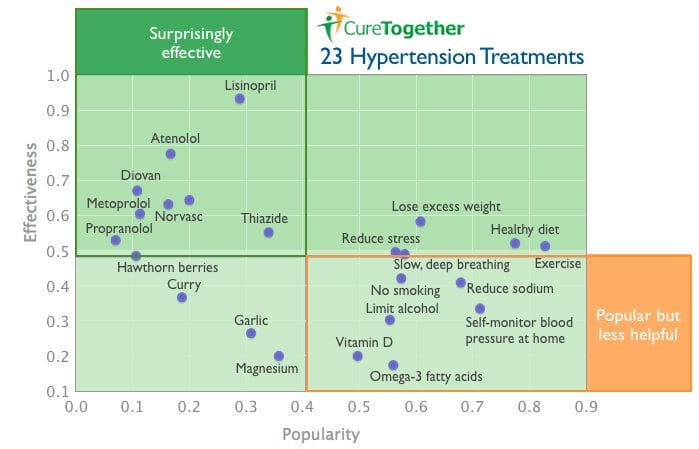 For the live-updated, fully-labeled, interactive version of this infographic, click here.
For the live-updated, fully-labeled, interactive version of this infographic, click here.
By Alex Carmichael, Co-Founder of CureTogether
As a new year starts, the effects of holiday stress may be lingering, especially for people who live with hypertension.
Some of the most popular treatments for hypertension are not necessarily the most effective, according to a new study by CureTogether, a free resource owned by 23andMe that allows people to share information about their health and treatments.
Most Effective
Participants in the study said they found that some drugs – including Lisinopril, Atenolol, and Diovan – were the most effective. Conversely, some popular treatments such as Omega-3 fatty acids, magnesium, and vitamin D, were among the least effective, according to the study.
Hypertension affects millions of Americans. Finding treatments that work well is important to improve the quality of life, so CureTogether asked people suffering from Hypertension to rate the effectiveness of different treatments.
Other Treatments
CureTogether’s study compiled responses from 577 people with hypertension, who rated the effectiveness of 23 different treatments. Among the most helpful treatments were beta-blocker and calcium channel blocker drugs. Also effective for those in the study were losing excess weight and reducing stress. The people in the study also said that limiting alcohol and smoking – both lifestyle changes – were not as effective.
1. Lisinopril
2. Atenolol
3. Diovan
4. Calcium channel blockers
5. Norvasc
6. Metoprolol
7. Lose excess weight
8. Thiazide diuretics
9. Propranolol
10. Healthy diet
Where did this data come from?
This is the result of a four-year CureTogether study on hypertension, in which people suffering from the condition shared information about their symptoms and what treatments worked best for them. We’d like to thank those who participated. And just as they shared their experience with hypertension treatments, we’re freely and openly sharing the results of the hypertension study.
This is part of a regular series of CureTogether research findings. CureTogether’s research findings are different than those made by 23andMe, which look at genetic associations with illness, traits and drug response. But as we continue our work with the CureTogether community, 23andMe hopes to incorporate more of this kind of self-reported information into our own research.
CureTogether presents its findings just as they are — patient-reported data — to stimulate discussion and generate new insights for further research.
Please tweet, blog, or pass this along to anyone who can benefit or is interested in hypertension. Thank you!